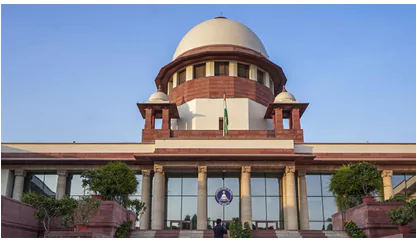The Supreme Court ruled that appropriate governments must consider the early release of eligible convicts without waiting for them or their relatives to apply for remission.
What is the premature release of a convict?

- The premature release of convicts refers to the early release of prisoners from their sentences before they have served the full term.
- This can occur for various reasons, such as good behavior, rehabilitation efforts, or changes in law.
Key Highlights of the Judgment
- Government’s Duty to Ensure Fair Remission Policies
-
- The power to grant remission must be exercised in a fair and reasonable manner.
- A uniform approach is necessary to prevent discrimination and arbitrariness.
- States and UTs must draft clear guidelines to eliminate ambiguity.
Article 72: President’s Power to Grant Pardon
- Article 72 of the Indian Constitution gives the President the authority to grant pardon, reprieve, respite, commute, or remit sentences, in certain cases.
- The President can exercise these powers in the following situations:
- Punishment by a Court-Martial
- Offenses Under Union’s Executive Power
- Death Penalty Cases
Article 161: Governor’s Power to Grant Pardon
- Article 161 of the Indian Constitution empowers the Governor of a state to grant pardon, reprieve, respite, remit, or commute sentences.
- Limitations of the Governor’s Power
- Applicable only to convictions under state laws.
- Cannot be used in cases involving court-martial (military court) sentences.
- Does not extend to offenses under the Union’s executive power (handled by the President under Article 72).
Famous remission cases in India
- Maru Ram v. Union of India (1980): This case upheld Section 433A that remission is not a right and should be given on the basis of well-defined rules.
- SC in this case held that The President and Governors’ power of clemency (Article 72 and 161) cannot be exercised that overrides this provision.
- Laxman Naskar v. State of West Bengal (2000): This case laid down the guidelines for granting remission to life convicts.
- Key considerations for remission
- Whether the criminal poses a threat to society after release.
- Whether the crime was committed under exceptional circumstances.
- The age and health of prisoners.
- Whether the prisoner’s release would be in public interest.
- The conduct of the prisoner during incarceration.
- Union of India vs V. Sriharan (2015): In this case, the court noted that States cannot unilaterally grant remission without central approval to convicts sentenced under Section 302 IPC (murder) or other central laws.
-
- It set clear boundaries and established that remission has some restrictions when dealing with serious crime like terrorism.
|
- Legal Basis for Remission
- Section 432 of the CrPC (now replaced by Section 473 of BNSS) empowers states, UTs, and the Central government to grant premature release to convicts.
- However, convicts serving life sentences for crimes punishable by death must serve at least 14 years before they become eligible for remission.
- Mandatory Formulation of Remission Policy
- All states and UTs must create a remission policy within two months if they do not already have one.
- Policies should:
- Define eligibility criteria.
- Prevent political or arbitrary decision-making.
- Ensure equal application of remission laws across all cases.
- Elimination of Political Interference in Remission
- The court highlighted past controversial remission cases, including:
- Bilkis Bano Case (2002 Gujarat Riots) – The premature release of 11 convicts was revoked due to improper government intervention.
- Anand Mohan Case (Bihar, 2023) – A political decision led to amending prison rules to facilitate his release.
- The case is still under judicial review.
- Ensuring Fairness and Transparency in Remission
- Obligation to Consider All Eligible Convicts
- If a remission policy exists, the government must review all eligible cases automatically.
- Convicts or their families do not need to apply for remission.
- Arbitrary decision-making violates Article 14 (Right to Equality).
- Justification for Granting or Denying Remission
- Decisions must be supported by clear reasons and promptly communicated to the convict.
- Denial of remission affects a convict’s liberty (Article 21), so principles of natural justice must apply.
- Conditional Remission and Its Restrictions
- Conditions for remission must:
- Prevent criminal tendencies.
- Ensure successful rehabilitation.
- Not be overly harsh or vague, making it impossible for convicts to benefit.
- Factors to consider:
- Nature of the crime.
- Criminal history.
- Impact on victims and public safety.
- Implementation and Monitoring Mechanism
- Legal Services Authorities’ Role
- Prison authorities must inform convicts about their right to challenge a rejection.
- District Legal Services Authorities (DLSAs) will:
- Maintain records of eligible convicts.
- Ensure state policies are followed.
- National Legal Services Authority (NALSA) must:
- Share the Supreme Court judgment with all state and UT legal bodies.
- Digital Tracking for Transparency
- A real-time digital portal will be created to track remission cases.
- This will ensure transparency and prevent delays.
- Protection Against Arbitrary Cancellation of Remission
- Once remission is granted, it cannot be revoked without due process.
- If a convict violates remission conditions, they must be given a hearing before cancellation.
- Cancellation orders must include clear reasons.
- Standard Operating Procedure (SoP) for Remission Cases
- The Supreme Court endorsed the SoP created by NALSA.
- Directed full implementation of the SoP, including a provision to:
- Ensure convicts are informed of their right to challenge rejection.
- Speed up the process of seeking a trial judge’s opinion on remission.
Issues in Granting Remission
Granting remission to prisoners involves various challenges such as legal, ethical, and administrative.
- Lack of Uniform criteria: Different states follow different rules for granting remission to prisoners which causes inconsistency in decision making.
- Political and Executive interference: Political considerations impact remission rather than merit.
- High profile cases often get political consideration and public sentiment.
- Public security: There are always high risks to re-offend or commit crime by serious criminals.
- Heinous crimes such as Political and Executive Interference raise concerns about public safety.
- Lack of transparency: Most of the remission decisions are taken behind the doors.
- Victims and the public play minimal roles in such a decision making process.
Remission of Sentences: Pros and Cons
Remission refers to the reduction of a convict’s sentence based on good behavior, rehabilitation, or other considerations. While it has several benefits, it also raises concerns about justice and security.
- Points in Favor of Remission
- Rehabilitation and Reintegration – Encourages good behavior, helping convicts reintegrate into society as responsible citizens.
- Decongestion of Prisons – Reduces overcrowding in prisons, improving living conditions for remaining inmates.
- Second Chance – Provides reformed individuals with an opportunity to lead a productive life.
- Humanitarian Consideration – Offers relief to those who have shown genuine remorse and personal reform.
- Points Against Remission
- Risk of Recidivism – Some convicts may reoffend, posing a threat to public safety.
- Victims’ Rights – Early release may undermine justice for victims and their families.
- Misuse of Discretion – Authorities may misuse remission powers, leading to favoritism and corruption.
- Public Perception – If seen as too lenient, remission may erode trust in the justice system.
|
![]() 20 Feb 2025
20 Feb 2025


